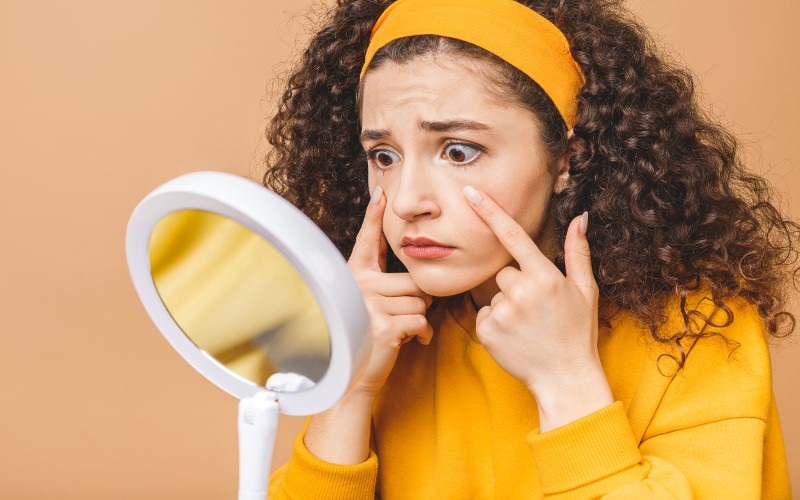
Are you wondering why your skin keeps breaking out despite your efforts? It might be linked to your lifestyle habits. The food you eat, your hydration levels, sleep quality, your skincare routine, and stress management all play a role in acne breakouts. Learn how these factors interconnect and discover practical tips to promote clearer, healthier skin.
5 Lifestyle Habits That Can Be the Reason Behind Acne Breakouts
Hop on below to explore how certain lifestyle habits influence your skin, causing acne breakouts, and how you can prevent and treat them.
Poor Diet and Acne Breakouts
The food you eat plays a significant role in the health of your skin. Diets high in sugar and processed foods can lead to increased inflammation throughout the body, which often manifests as acne breakouts. Moreover, dairy products and foods with a high glycemic index have been associated with worsening acne symptoms.
To combat this, opting for a balanced diet rich in fruits, vegetables, lean proteins, and whole grains is essential. These foods provide essential nutrients and antioxidants that help nourish the skin from within. Incorporating foods high in antioxidants like berries, leafy greens, and nuts can help fight free radicals and reduce inflammation, promoting clearer skin.
Additionally, omega-3 fatty acids in fish, flaxseeds, and walnuts can help regulate oil production and reduce the risk of clogged pores, contributing to a healthier complexion.
In contrast, limiting your intake of sugary snacks, refined carbohydrates, and greasy foods can help stabilize blood sugar levels and reduce the risk of acne breakouts. By making mindful choices about the foods you consume, you can support your skin's natural processes and reduce the likelihood of experiencing acne flare-ups.
Inadequate Hydration
Proper hydration is essential for maintaining the health and appearance of your skin. When dehydrated, your skin can become dry, dull, and prone to breakouts. Drinking adequate water daily helps flush toxins from the body, allowing your skin to maintain its natural balance and clarity. Without enough water, your skin may produce excess oil to compensate for the lack of moisture.
Aim to drink at least eight glasses of water daily, and consider increasing your intake during hot weather or periods of physical activity. In addition to water, consuming hydrating foods such as cucumbers, watermelon, and celery can also contribute to your overall hydration levels.
While other beverages like herbal teas and coconut water can also contribute to your fluid intake, limiting your consumption of caffeinated and sugary drinks is essential, as they can dehydrate the body and exacerbate acne symptoms. By prioritizing hydration and making conscious choices about your drink, you can support your skin's natural hydration levels and promote a clearer, more radiant complexion.

Lack of Sleep
Quality sleep is crucial for overall health and well-being, including the health of your skin. During sleep, your body undergoes a process of repair and regeneration, which is essential for maintaining clear, youthful-looking skin.
When you consistently fail to get enough sleep, your body experiences increased levels of stress and elevated cortisol that triggers inflammation and contributes to acne breakouts. Additionally, inadequate sleep can impair the skin's ability to regenerate and repair itself, leading to a dull complexion and increased susceptibility to breakouts.
To prioritize quality sleep, establish a consistent bedtime routine, and create a sleep-friendly environment free of distractions. Aim to get 7-9 hours of uninterrupted sleep each night, allowing your body ample time to rest and rejuvenate. Avoid stimulants like caffeine and electronic devices before bedtime, as they can interfere with your ability to fall asleep and achieve restorative rest.
Incorporating relaxation techniques such as meditation, deep breathing exercises, or gentle stretching before bed can also help promote relaxation and prepare your body for sleep. By prioritizing restful sleep and making it a non-negotiable part of your daily routine, you can support your skin's natural renewal processes and reduce the likelihood of experiencing acne breakouts.
Poor Skincare Habits
Your skincare routine plays a crucial role in the health and appearance of your skin. Using harsh or abrasive products can strip the skin of its natural oils and disrupt its delicate balance, leading to irritation and inflammation that can exacerbate acne breakouts. Choosing skincare products that are gentle, non-comedogenic, and suited to your skin type is essential. Opt for mild cleansers that remove dirt, oil, and impurities without stripping the skin's natural moisture barrier.
In addition to cleaning, it's important to moisturize your skin regularly to keep it hydrated and supple. Look for lightweight, non-comedogenic moisturizers that won't clog pores or exacerbate acne symptoms. When selecting skincare products, be mindful of ingredients that may be irritating or comedogenic, such as fragrances, alcohol, and certain oils. Patch-test new products before applying them to your face, and discontinue use if you experience any adverse reactions.
Establishing a consistent skincare routine that includes cleansing, moisturizing, and sun protection can help keep your skin healthy and clear. Remember to cleanse your face twice daily, morning and night, and follow up with a moisturizer to lock in hydration.
Stress and Acne
Stress is a common trigger for acne breakouts, as it can disrupt the delicate balance of hormones and increase oil production in the skin. When you're under stress, your body releases hormones like cortisol and adrenaline, stimulating the sebaceous glands to produce more oil. This excess oil and dead skin cells and bacteria can clog pores and lead to acne flare-ups.
Managing stress is essential for maintaining clear, healthy skin. Incorporating stress-reduction techniques into your daily routine can help keep stress levels in check and minimize the risk of acne breakouts.
Activities like yoga, meditation, deep breathing exercises, and mindfulness can help calm the mind and promote relaxation and well-being. Additionally, engaging in regular physical activity, spending time outdoors, and connecting with friends and loved ones can help alleviate stress and improve overall mental health.
It's important to identify sources of stress in your life and develop healthy coping mechanisms to manage them effectively. Set boundaries to protect your mental and emotional well-being, and don't hesitate to seek support from a therapist or counselor if you're struggling to cope with stress.

Conclusion
Several lifestyle habits can contribute to acne breakouts, but you can help keep your skin clear and healthy with mindful adjustments. By prioritizing a balanced diet, staying hydrated, getting enough sleep, practicing stress management techniques, and adopting a gentle skincare routine, you can minimize the risk of acne flare-ups and promote clearer, more radiant skin



